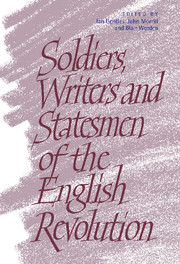Book contents
- Frontmatter
- Contents
- Preface
- Austin Woolrych: an appreciation
- 1 Secret alliance and Protestant agitation in two kingdoms: the early Caroline background to the Irish Rebellion of 1641
- 2 Of armies and architecture: the employments of Robert Scawen
- 3 George Digby, Royalist intrigue and the collapse of the cause
- 4 The iconography of revolution: England 1642–1649
- 5 The casualties of war: treatment of the dead and wounded in the English Civil War
- 6 ‘A bastard kind of militia’, localism, and tactics in the second civil war
- 7 Cromwell's commissioners for preserving the peace of the Commonwealth: a Staffordshire case study
- 8 Colonel Gervase Benson, Captain John Archer, and the corporation of Kendal, c. 1644—c. 1655
- 9 Repacifying the polity: the responses of Hobbes and Harrington to the ‘crisis of the common law’
- 10 Equality in an unequal commonwealth: James Harrington's republicanism and the meaning of equality
- 11 John Milton and Oliver Cromwell
- 12 From pillar to post: Milton and the attack on republican humanism at the Restoration
- 13 ‘They that pursew perfaction on earth …’: the political progress of Robert Overton
- 14 Locke no Leveller
- A bibliography of the writings of Austin Woolrych, 1955-95
- Index
8 - Colonel Gervase Benson, Captain John Archer, and the corporation of Kendal, c. 1644—c. 1655
Published online by Cambridge University Press: 10 November 2009
- Frontmatter
- Contents
- Preface
- Austin Woolrych: an appreciation
- 1 Secret alliance and Protestant agitation in two kingdoms: the early Caroline background to the Irish Rebellion of 1641
- 2 Of armies and architecture: the employments of Robert Scawen
- 3 George Digby, Royalist intrigue and the collapse of the cause
- 4 The iconography of revolution: England 1642–1649
- 5 The casualties of war: treatment of the dead and wounded in the English Civil War
- 6 ‘A bastard kind of militia’, localism, and tactics in the second civil war
- 7 Cromwell's commissioners for preserving the peace of the Commonwealth: a Staffordshire case study
- 8 Colonel Gervase Benson, Captain John Archer, and the corporation of Kendal, c. 1644—c. 1655
- 9 Repacifying the polity: the responses of Hobbes and Harrington to the ‘crisis of the common law’
- 10 Equality in an unequal commonwealth: James Harrington's republicanism and the meaning of equality
- 11 John Milton and Oliver Cromwell
- 12 From pillar to post: Milton and the attack on republican humanism at the Restoration
- 13 ‘They that pursew perfaction on earth …’: the political progress of Robert Overton
- 14 Locke no Leveller
- A bibliography of the writings of Austin Woolrych, 1955-95
- Index
Summary
Gervase Benson and John Archer entered the government of the Cumbrian market town of Kendal in 1640. Once the royalists in south Westmorland had been neutralised by the Scots in 1644, the two men became increasingly important in Kendal corporation. Unlike a number of their corporation seniors, they did not support the king in the second civil war in 1648. Later they pushed to dismiss those royalists from the government of Kendal. Benson and Archer removed a third of the corporation, royalists and others, in a purge mounted through the imposition of the Engagement in 1650. At some point, Benson's religious opinions led him to sectarianism, eventually as a Quaker. Thus his old but more conservative ally John Archer assisted in his removal from the corporation in 1653. Their public disagreement in that year helped to ensure that a vitriolic quarrel in print and pulpit, street and jail, was carried on in Kendal. The corporation finally removed its last Quaker member in 1655, though Quakers remained in the town.
Two points emerged from this contribution to the history of Kendal. The first, which has been given little emphasis, is the relationship between local and central government. It was a concern recurrently prominent during the revolutionary decades: for example, the second civil war can be explained by the dissatisfaction of the localities with the policies of the London parliament; later, Cromwell's major-generals proved a centralising imposition on the localities, resented and thus unworkable.
- Type
- Chapter
- Information
- Soldiers, Writers and Statesmen of the English Revolution , pp. 183 - 201Publisher: Cambridge University PressPrint publication year: 1998



